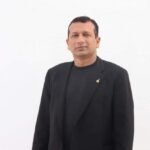Tehran (TDI): Federal Minister for National Food Security and Research, Rana Tanveer Hussain, has reiterated Pakistan’s commitment to expanding trade and agricultural cooperation with Iran, stressing the need to transform longstanding cultural and religious ties into practical economic partnerships.
He expressed these views during a meeting with Akbar Behnamjou, Governor of Qom Province, at the Governor’s office.
The two sides explored ways to deepen collaboration in agriculture and food security, identifying it as a cornerstone of future economic integration.
Rana Tanveer highlighted Pakistan’s capacity to export premium-quality rice, mangoes, halal meat and maize, while noting Iran’s strengths in saffron, pistachios and dry fruits.
Read More: Pakistan, Iran Reiterate Economic Integration
He underlined that sharing expertise in these sectors could create a mutually beneficial framework.
The discussions also focused on practical measures to streamline trade, including customs facilitation, improved sanitary and phytosanitary (SPS) protocols, and investment in logistics infrastructure such as cold chains and warehousing to preserve product quality.
The minister welcomed Iran’s readiness to substantially increase imports from Pakistan, particularly rice, maize and halal meat.
He noted Tehran’s commitment to sourcing up to 60 percent of its meat imports from Pakistan and to addressing issues affecting mango exports and foreign exchange allocations.
Read More: Pakistan-Iran Ties Bolstered by Pezeshkian’s Landmark Visit
Calling the talks a “pivotal step” toward a sustainable agricultural alliance, Rana Tanveer invited Governor Behnamjou and senior agricultural officials to visit Pakistan.
He stressed that greater institutional and people-to-people exchanges would help cement this evolving partnership.

Sohail Majeed
Sohail Majeed is a Special Correspondent at The Diplomatic Insight. He has twelve plus years of experience in journalism & reporting. He covers International Affairs, Diplomacy, UN, Sports, Climate Change, Economy, Technology, and Health.



